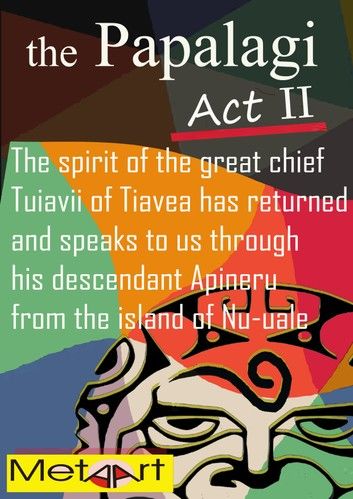| FindBook |
|
有 1 項符合
metaart的圖書 |
 |
$ 68 電子書 | The Papalagi Act II
作者:Elisabeth Wisler 出版社:MetaArt 出版日期:2014-09-25 語言:英文  看圖書介紹 看圖書介紹
|
|
|
It's normal for westerners to travel in different worlds from their own and then write about their experiences. It's a lot less common to come across someone from another world who describes what they have experienced in our world. We westerners are centered in our cultural reality and take it for granted while that of others is only considered in a peripheral way. When this viewpoint is shattered the egocentric western outlook is deeply disturbed. So, almost a century ago the German poet Enrich Sheurmann was the first, followed by millions, to delight in the reminiscences of the Tuavian Chief, who, on his return to Samoa described to his people the Westerner, the Papalagi, and how he lives.
That account is certainly one that shouldn’t be forgotten on the bookshelf as having already been read. In its simplicity and frankness it is ready at any moment to shine a blessed ray of light on the clouded heart of western man. But the time of Tuavii is already long gone. The Papalagi has not stopped his mad race and his world meantime has changed. A descendant of Tuavii, Apineru, chief of a small community left his little island for about a year travelling to the west in the seventies. In Papalagi Act II, Apineru while sitting on his mat, describes what he has seen and experienced to his family members and other islanders that visit him of evenings in his hut. What is the everyday life of a westerner, what are progress, television and freedom to a man, seemingly uncultured, yet with only the good and well-being of his virgin island at heart? His style follows no logic, there’s no false pretence in his criticisms and the impressions that he communicates and the images that he describes do not follow any classical line of analysis that the Papalagi are used to. Apineru cuts through all the usual paradigms simply with the freshness of his sentiment, in the poetry and magic of his singular imagination, provoking us to smile and look beyond the daily shortcomings of so called modern life.
Available in German, French and Italian.
The original version of the Papalagi edited by Erich Sheurmann has been published in English by Legacy Editions in 1997, under the title Tuiavii's way. The text (no copyright) can be read also here http://www.nonduality.com/papalagi.htmIndex
"The Papalagi poisons himself day after day, word after word, action after action, mouthful after mouthful. He doesn’t die straight away as was about to happen to me, but a bit by bit, day after day. In the end, he is dead even without realizing it. But now too much time has passed from the moment that the poisoning has begun and so the dead Papalagi doesn’t remember anything of how life was at the beginning. So the Papalagi behaves like the protagonist of that story that a village chief told me when he visited our island on the day I got married. It is told that a certain Ira left his island where he had his father, mother, brothers and sisters to look for pearls on other islands even though you could find marvellous pearls in the sea around his. He reached another island in his canoe and stayed there for a while finding pearls, but a bit smaller than those found around his. So he left even that island to go to another, then another again, finding pearls but always smaller. He arrived at a sixth island, and here the pearls were so small that you could hardly see them. One morning he took his canoe out and reached a seventh island. He landed and here he met some men and women to whom he immediately tried to sell his merchandise. Straightaway the islanders recognized him as the brother who had left a long time before, who, from a seeker of precious pearls, had transformed into a collector of empty shells. In fact he had returned to the island from which he had begun his adventure, but he wasn’t aware of it..."
MetaArt Editions metaart.info@gmail.com
Coming Publications:
The Submarine and the Whale, by Cristelle Wells
The King’s Chef, by Amussis Charisteas
|










